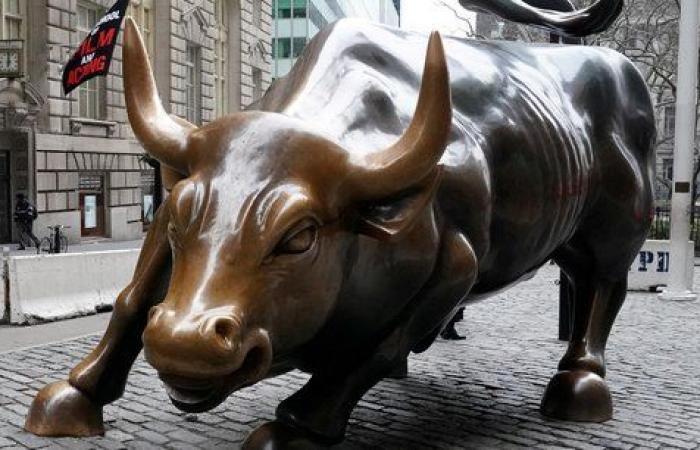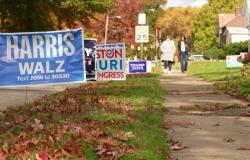What happened on October 18? A priori nothing. Otherwise, the markets have started to focus on the American election. “It’s as if the market, which had lost interest in the American elections for months, suddenly woke up in the home stretch,” observes a manager.
On the other hand, one certainty since mid-October, that the advance of the Democratic candidate in the November 5 presidential election, Kamala Harris continues to erode in national polls. According to the famous poll aggregator 538, this lead over Republican candidate Donald Trump is only 1.4 percentage points (as of October 29), compared to 2.8 points on September 13, following the televised debate. In 2020, on the eve of the previous elections, Joe Biden had a lead of 8 points.
American presidential election: tax relief on tips, a false good idea for the candidates
The Polymarket betting platform, the new market compass, gave Donald Trump a 67% victory on October 29, compared to 55% on October 18. The scenario of a red wave (simultaneous Republican victory in the White House, the House of Representatives and the Senate) is even close to 50%. Another signal: the stock of Donald Trump Media Corporation (DJT), whose only asset is the Truth Social network – popular with the American extreme right, but little used – gained 50% in five days and 200% in one month ( before losing 20% again this Wednesday). Which still values Donald Trump's social network at $10 billion, the equivalent of X (ex-Twitter) of his ally Elon Musk.
Sudden rise in bond rates
It was above all the “American 10-year” (yield on the ten-year United States bond) which sounded the alarm of the “Trump Trade” (prospect of a Trump victory) when the yield on the American bond began to rise sharply to approach the threshold of 4.3%. Its highest level since July, before the reduction in key rates by the Federal Reserve (Fed).
“It’s as if the market, which had lost interest in the American elections for months, suddenly woke up in the home stretch,” observes a manager.
“What caused the rise in US long-term rates at the beginning of October was essentially the readjustment (repricing) of the Fed's rate expectations following the latest employment report, a feeling reinforced by other elements, such as the 'inflation or the strength of retail sales'explains Gilles Möec, chief economist and head of research at AXA IM. But, he adds, “no new element then fueled the increase in yield [de l’obligation américaine]otherwise the fairly clear drop in Kamala Harris' lead.
Trump's program is, in the opinion of all economists, inflationary. As a reminder, it provides for the massive expulsion of illegal workers and the general increase in customs duties. According to estimates noted by AXA IM, each point of less active population generates 0.5 point of additional inflation, and each point of additional customs duty translates into 0.1 point of additional inflation and 0. 1 point of growth in months. The two combined are starting to add up to a lot.
“In reality, it's quite difficult to distinguish what constitutes a 'Trump Trade' from Fed policy or other macroeconomic factors at play, such as the labor market which is doing relatively well”nuance Benoît Gerard, strategist at Natixis CIB.
Stocks hover over elections
On stocks, the messages about the upcoming elections are also not easy to decipher. American indices seem to be flying above the fray. They are entering their best half of the year, with new strong increases. Volatility is certainly higher than average, but without being excessive. Investors are keeping an eye on rate cuts, corporate results and the scenario of a soft landing for the American economy.
Stock market, bonds, gold: the winners and losers of a Trump victory
Everyone is trying, like the Bloomberg agency, to create “Trump” indices (Automobile, Tech, banks, etc.) or “Harris” indices (consumption, media, collective services, etc.), with no obvious conclusion. No “Trump Trade” is evident in the sectors that the Republican candidate could favor, except for a slight tremor in average values. These could benefit from tax cuts, renewed protectionism and deregulation.
Investors could, however, be tempted to take inspiration from the markets in 2016 to get an idea of the repercussions of a Trump victory. At the same time, they do not seem to have a pre-established plan if Kamala Harris were to win, other than that of continuity with the Biden period (rather profitable for stocks).
“We have lots of unanswered questions and we are in an intermediate risk market », notes Emilie Tetard, “cross assets” strategist at Natixis.
“However, US elections have never interrupted a stock trend,” notes the market expert. And the trend should once again follow the third quarter results of the “magnificent 7”, these Tech stocks which have been popular in America for two years.
Finally, the only dark note comes… from Elon Musk, expected to join the possible future Trump government. On the social network an initial overreaction in the economy and markets that will collapse” (in the event of victory for the Republican camp), the president of Tesla simply replied: ” I agree “.






